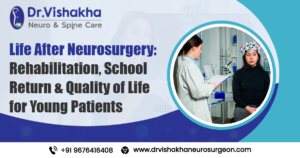Neurotrauma in children is a significant issue affecting their developing brain and nervous system, often resulting from falls, accidents, sports injuries, or abuse. It can lead to concussions, brain contusions, or severe injuries like traumatic brain injury (TBI). Early intervention and proper management are crucial for reducing long-term damage and ensuring children recover to lead healthy lives. Promoting brain health from an early age can significantly reduce the risk of neurotrauma and enhance a child’s overall quality of life. Children are particularly vulnerable to such injuries due to their developing brains and bodies.
Brain-Boosting Strategies for Kids
Encourage safe physical activity.
Physical activity is vital for children’s health and development, promoting fitness, brain function, social skills, and preventing chronic diseases. However, it’s crucial to ensure safe activity to prevent injury, especially neurotrauma. Encouraging safe movement involves teaching children how to engage in movement while prioritizing safety. Regular physical activity builds strong muscles, reduces bone fractures, improves cardiovascular health, and strengthens immune systems. It also enhances brain function, memory, learning, and concentration. Exercise reduces stress and anxiety, improving emotional health and resilience. A culture of safety is crucial for children to enjoy the benefits of physical activity.
Ensure proper sleep
Adequate sleep is crucial for children’s overall growth and development, including their physical, emotional, and cognitive well-being. Through sleep, our bodies repair tissues, consolidate memories and regulate emotions. Adequate sleep is especially important during the rapid growth phase, as it maintains good health and optimizes brain function, mood, and overall well-being. Physical growth is facilitated by sleep, as the body releases growth hormones for tissue repair. Sleep strengthens the immune system, allowing children to fight off infections more effectively. Cognitive function and learning are enhanced by sleep as the brain consolidates new information and skills. Adequate sleep boosts problem-solving skills, creativity, and critical thinking, which are essential for academic success. Emotional and mental health are also improved by sleep.

The consequences of sleep deprivation
Sleep deprivation significantly impacts a child’s development, leading to physical health issues like weakened immune systems, growth problems, and weight gain. It disrupts hormones regulating hunger and metabolism, causing overeating and unhealthy weight gain.
Cognitive and academic impacts include poor memory, reduced attention, and decreased academic performance.
Emotional and behavioural problems include irritability, anxiety, stress, hyperactivity, and impulsivity. Insufficient sleep impairs the immune system, making children more susceptible to infections and weight gain. Parents and caregivers can help establish healthy sleep habits by creating a consistent routine, maintaining a conducive sleep environment, promoting physical activity, and addressing stressors.
Foster healthy nutrition
A balanced diet is essential for a child’s physical growth, cognitive development, and brain health. It includes nutrients like calcium, vitamin D, protein, carbohydrates, fats, proteins, vitamins, minerals, and antioxidants for immune system support. Cognitive development and brain health require omega-3 fatty acids, iron, and zinc for growth, memory, and learning. Emotional regulation is supported by B vitamins and omega-3 fatty acids for mental well-being. Long-term health benefits include reduced risk of chronic diseases, weight management, and developing chronic conditions later in life. To nourish your child, incorporate a diet rich in colourful fruits and vegetables, whole grains, lean proteins, and healthy fats. Restrict sugary foods and processed snacks to maintain a balanced diet. Parents play a crucial role in promoting healthy nutrition in children.
Promote mental stimulation
Reading and storytelling are essential for language development, vocabulary building, comprehension skills, imagination, and critical thinking. Engaging in daily reading and discussing stories together can foster imagination and critical thinking. Puzzles and problem-solving games, such as Sudoku or crossword puzzles, help children understand cause and effect and enhance their critical thinking abilities. Artistic activities stimulate different brain areas and encourage creativity. Interactive learning tools like educational apps, STEM toys, and LEGO promote logic, design thinking, and understanding of basic principles of science and technology. Physical activities like yoga and martial arts improve mental stimulation. Conversations and discussions stimulate cognitive abilities like listening, comprehension, and articulation. Memory games and exercises enhance attention, memory retention, cognitive flexibility, recall ability, and focus.

Encourage social interaction
Social interaction is a crucial part of children’s development, influencing their emotional well-being, cognitive growth, and social abilities. It helps children develop skills like effective communication, empathy, cooperation, and conflict resolution, which are essential for success in academic, professional, and personal relationships. Socializing helps children develop self-confidence, self-esteem, and emotional regulation, allowing them to express their feelings appropriately and develop coping mechanisms for stress. Social interactions also improve cognitive and communication skills, teaching children to practice language, expand their vocabulary, and improve communication abilities. They also teach them problem-solving and conflict-resolution skills, teaching them to negotiate, share, and cooperate. Socially active children are less likely to experience loneliness, anxiety, or depression, and their academic performance is positively impacted by comfortable group work, collaboration, and communication.
Monitor screen time
The digital age has led to a rise in screen time for children, causing negative impacts on their physical health, cognitive development, and social well-being. Excessive screen time can cause sleep disturbances, digital eye strain, discomfort, dryness, and blurry vision. Obesity and sedentary lifestyles can result from children forgoing physical activities, increasing the risk of childhood obesity and long-term health issues. Cognitive development can be affected by reduced attention span, academic performance, and impaired critical thinking. Social media exposure can also negatively impact self-esteem and body image. Parents can help children manage technology risks by setting time limits, encouraging quality content, and promoting a balanced lifestyle.
Manage stress and promote emotional health.
Chronic stress significantly impacts children’s emotional and physical well-being as they face life challenges like academic pressures, family changes, and peer relationships. Effective stress management is crucial for healthy development, as children with resilience and coping mechanisms are better equipped to handle future stress. Self-esteem, cognitive function, problem-solving abilities, physical health, and behavioural and social health influence emotional health. Children who manage stress effectively are less likely to experience emotional outbursts, anxiety, or depression and are better at handling conflicts and cooperative play. Critical function is also affected by chronic stress, impairing focus, learning, and academic performance. Effective stress management practices include regular physical activity, adequate sleep, a healthy immune system, and open communication.
Neurotrauma is a significant issue for children, but with proper education, safety measures, and preventive strategies, risks can be minimized. Promoting overall brain health through physical activity, nutrition, mental stimulation, and emotional support is crucial for a healthy brain. Prioritizing both prevention and health promotion helps children build a foundation for cognitive, emotional, and physical well-being. By combining proactive prevention and health promotion strategies, parents, caregivers, and communities can significantly reduce neurotrauma risk and support optimal brain development in children.
About Dr Vishakha :
Dr Vishakha Basavraj Karpe is a highly skilled senior consultant at Rainbow Children’s Hospital in Banjara Hills and Hydernagar Hyderabad. She is known for her comprehensive care approach and is one of the few dedicated leading paediatric neurosurgeons in the city and India with over ten years of extensive experience in pediatric neurosurgery. Her expertise includes treating hydrocephalus, spinal dysraphism, craniosynostosis, paediatric brain infections, brain and spine tumours and stroke surgery.
She has a special interest in craniosynostosis surgery, which is done only in very few centres in India.
Proficiency of Dr Vishakha:
-
- Hydrocephalus (increased fluid in the brain): The procedure involves an endoscopic third ventriculostomy and CSF diversion (VP shunt) to treat complex hydrocephalus.
- Craniosynostosis (abnormal head shape due to untimely cranial sutures fusion) surgeries: Helmet therapy is a technique that is used in both endoscopic and open surgery.
- Spinal dysraphisms(Spina Bifida)- (spinal abnormalities present by birth) – surgical repair
- Encepahaocles repair surgery.
-
- Vascular conditions and stroke surgeries: revascularization surgeries for moya moya disease.
- Pediatric brain and spine tumour surgeries.
-
- Pediatric brain and spine infection surgeries: Endoscopic and open surgeries for brain and spine infections.
- Pediatric traumatic brain and spinal injury.
- Antenatal counselling for congenital fatal neurosurgical conditions.





